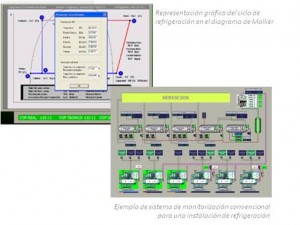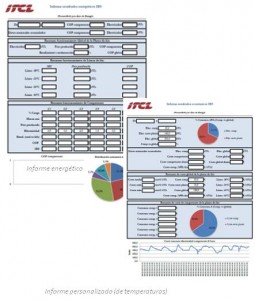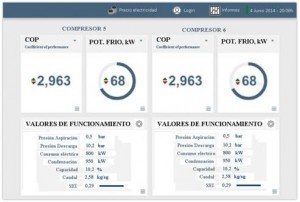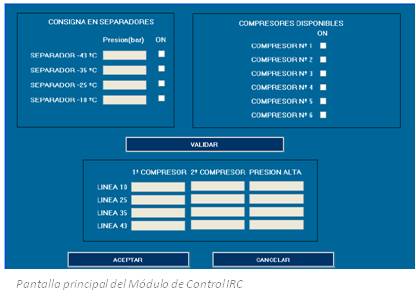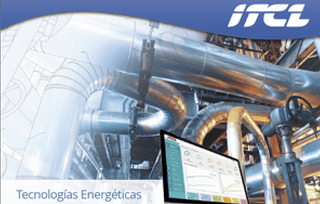Energy Systems and Models for Industrial Applications
Energy Systems and Models for Industrial Applications
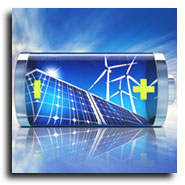
Promoting energy efficiency, integration of renewable energy, sustainability and energy transition are the main goals of Energy Systems and Sustainability unit, carrying out national and international projects capable of implementing technological solutions in various sectors.
Our team works every day to increase the competitiveness of the productive sectors, as well as to facilitate compliance with national and international environmental commitments: defined at COP26, the 26th Conference of the Parties (COP) of the United Nations on climate change.
Energy transition has become a term of reference for the transition to new, cleaner energy sources. It requires a fundamental restructuring of the energy supply system and poses technological challenges.
The EU’s strategy to reform the European electricity market recognises and promotes the right of consumers to generate, sell and share their own electricity. According to European Commission estimation, more than 100 GW of wind and solar energy could be owned by energy communities by 2030.
Digitalisation will play a key role in solutions to address the challenges of decentralisation, flexibility and efficient energy use. Thus, digitalisation can be seen as an enabler for the progressive growth of renewable energies.
In context of the energy transition, hydrogen is seen as an important means of storing energy from renewable sources. Availability of renewable energy is seen as the central challenge for a decarbonised energy supply. In order to have sufficient electricity available even when renewable energy producing equipment cannot supply it due to variable weather conditions, energy storage options are needed. Hydrogen must make a decisive contribution in this respect, being complementary to other storage systems.
Over the last few years, ITCL has accumulated extensive experience and demonstrable results in the study and improvement of energy efficiency in large buildings, industrial production systems and their auxiliary systems.
Frequent collaborations of this research group with industrial and energy companies, as well as in large buildings, are focused on:
– development of specific projects, with R&D components, to design and implement solutions that are not available on the market,
– carrying out energy audits,
– implementation of energy management and efficiency systems.
ITCL currently has specific tools for industrial, energy and residential installations, always with the aim of improving energy efficiency by generating savings in the cost associated with their operation:
– Intelligent systems for supervision and integrated control of energy consumption in large installations.
– SIGE energy management systems. Decision support software.
– Systems for implementation of renewable energies and storage. Energy demand management. Mobility: hydrogen stations, chargers for electric vehicles.
MEMBERS OF THE R&D GROUP
David Gonzalez and Phd Javier Sedano are in charge of the Energy Systems and Models department.
Phd Javier Sedano is the manager of the Energetic Models knowledge unit. He is an expert in the development of electronic devices (hardware) and in industrial control systems, as well as in the design of connectionist models for identification, classification and dynamic systems modelling in Big Data and Blockchain.
David Gonzalez works as a Project Manager of this department. He is the technical responsible for R&D projects in the Energetic Efficiency and Sustainability department. David is an expert in energetic efficiency in both industry and services, energetic audits and ISO50001 implementation, as well as in R&D&I European and National projects.
Javier Gonzalez works as a Project Manager of this department. He is the technical responsible for the development of energetic models in the industry. Javier is an expert in refrigeration installations in industrial environments, development of energetic management systems and in European R&D&I Projects.
Phd Cesar Merino works as a Project Manager of this department. He is the technical responsible for R&D projects in Hidrogen
DEVELOPMENTS FOR INDUSTRIAL REFRIGERATION SYSTEMS
IRS INDUSTRIAL REFRIGERATION SUPERVISION
ENERGY MONITORING SYSTEM FOR INDUSTRIAL REFRIGERATION SYSTEMS

With the vision of putting technology at the service of energy efficiency, ITCL has focused on R&D&I to give added value to Energy Efficiency projects.
Awareness of sustainable development is gaining momentum among individuals, companies and institutions.
This product is a specific solution for the supervision of industrial refrigeration installations, in order to follow its path towards energy efficiency through an innovative approach and with great impact on the energy consumption of its plants.
CHARACTERISTICS
- Monitoring of the efficiency of the refrigeration installation in real time in parallel with the main Scada.
- Real time monitoring of the “energy efficiency” based on the production of cold and the consumption of the installation at every instant.
- Detailed information on the main operating parameters and energy aspects of the refrigeration plant, including economic costs.
- By applying specific thermodynamic equations for each installation, it provides data that cannot be determined by conventional monitoring systems.
FUNCTIONS
- By means of a computer application, it offers relevant information in real time of the energy indicators of the refrigeration installation:
- Compressor performance
- Performance deviation from ideal performance
- COP (Coefficient of performance), instantaneous and global
- Amount of cold produced
- Daily costs associated with cold production
- Average cost kWh/cold produced
- Breakdown of consumption by equipment and by period
- It allows to generate daily/weekly/monthly reports, offering a global vision of the operation of the cold plant.
- Generates energy reports
- Economic reports
- Personalized reports according to the client’s needs (temperature in chambers, freezing tunnels…)
OBJECTIVES
- Quantify the current level of energy efficiency of the installation.
- Identification of the real potential for energy improvement.
- Daily control of energy efficiency, energy consumption and associated costs
IRC INDUSTRIAL REFRIGERATION CONTROL
Intelligent energy control and optimisation system specifically for industrial refrigeration systems
The IRC Industrial Refrigeration Control allows us to reduce the energy consumption of the refrigeration plant through the modification of key parameters of the installation.
Experiences to date have resulted in savings of between 15% and 40%, with investment returns of between 6 and 18 months.
CHARACTERISTICS
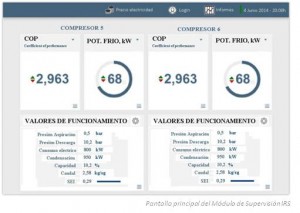
- IRC Based on data monitored by ITCL’s IRS energy monitoring system.
- Calculated in real time the optimal equipment configuration parameters that maximize the plant’s energy efficiency for the real cooling needs at any given moment.
FUNCTIONS
- An expert, tailor-made control is designed for each industrial refrigeration installation based on its cooling and climatic zone needs.
- The expert control will act automatically over the general control automaton of the refrigeration plant, modifying its key parameters in order to increase the overall performance of the installation.
- The following aspects are optimised by means of decision algorithms based on real-time operating parameters:
- Sequence of operation of the main equipment
- Start and stop instructions
- Operating instructions (pressures, temperatures…)
SUCCESS STORIES
CASE 1: IMPROVED CONTROL IN A MEAT SLAUGHTERHOUSE
- Pig slaughterhouse 1MM carcasses/year
- Improvement of the cold production obtained with an expert control system developed to measure
- 20.5% reduction in the energy consumption of the refrigeration plant
- Actual savings: 166,000 €/year // Payback: 6 months
CASE 2: COMPRESSOR CONTROL OPTIMIZATION
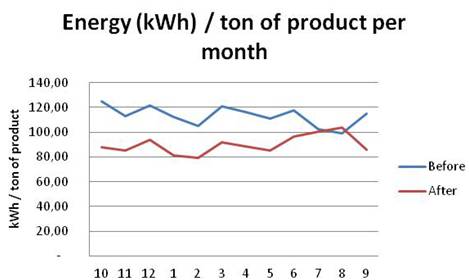
- Seafood Processing Company
- Proposal of change of standard control of compressors in refrigeration installation by an expert control proposed by ITCL.
- 42% improvement in annual energy consumption
- Annual saving: 180,000 €/year

